

The creator economy has established itself as a core part of the internet; in fact it’s the underpinning of all of Web2: users create the value of many of the largest platforms. It’s pervasive in games as well, where ‘User-Generated Content’ is a standard feature in many titles, and in cases like Roblox, the entirety of the content. This is a great first step, and introduces a layer of ‘players as creators’. For the next generation of virtual worlds, however, we can take that much further. We can make virtual worlds focused not just on User Generated Content but User Generated Societies.
A User Generated Society goes beyond content, allowing Citizens to define the design of their communities. It allows the creation of civic structures to support Citizens in their goals, to band them together in a shared endeavor. It requires the creation of institutions (like towns, countries, courts, banks, schools, etc) and the governments that regulate them. It creates a sustainable and rich space for communities to grow, with relationships among citizens of various settlements forming the foundation, yielding exponentially growing meaningful connections and depth.
In our game Eco this idea is a core tenant. Citizens create their government from scratch, including the laws, elections, positions of power, and constitution distributing that power. They create the economy from the goods and services they provide to one another by their varied specialties, as well as the currencies in which those transactions are executed, and the taxes and regulations levied upon them. And (in an upcoming update) they create the towns that organize groups of Citizens, the countries that organize groups of towns, and the federations that organize groups of countries. Each of these entities has overlapping governments and economies, and interactions between them both laterally and vertically. It creates quite the nest of complexity, that of a rich and meaningful world, but from the perspective of any Citizen their individual relationships can be grasped and understood and navigated.

The hierarchical layers of community in Eco.
This approach works in games with a detailed simulation at their core, upon which society is built. There needs to be a base-layer physics which is not user-defined, the hard-check of reality against humanity’s grand designs. This underlying physics forms the bedrock upon which the human rules of society can be built, and also the reason they need to be built at all: human powers are constrained by nature, but by coming together in a society they can be understood, organized, and utilized.
The specifics of this underlying physics don’t have to be constrained to modelling actual physical laws either. In Eco for example we have a physics simulation that governs how objects move about, as well as an ecosystem that determines the temperature, soil moisture, and rate of climate change based on atmospheric CO2. But we also have a simulation of law-enforcement, where Citizen created laws cannot be violated and, once enacted, are binding. These rules serve as an extension to the physics of the world, which allows the focus of our development and gameplay mechanics to be upon the design, agreement, and implementation of those rules, not their enforcement. It also overcomes limitations where what is being simulated doesn’t match reality (ie, you don’t spend your entire waking hours in the game, so it simulates as if you do).
With a strongly defined physics layer which is inviolable and which all citizens are subjected to, the grand project of citizens creating a society atop it can begin.
Unlike User Generated Content, the institutions created in User Generated Societies are not constructed outside the game in a separate mode. Constructing them is the game, and something all Citizens can participate in. Designing a government is a messy process involving the consensus of large numbers of citizens, and navigating something like that is a challenge that can be immensely impactful, yet is scarcely seen as a primary part of a game.
Picture a Constitutional Convention in game, taking place in a Capitol built by Citizens of many professions brick-by-brick, where Citizens of many towns, each having cultivated a home, a profession, and relationships in the world come together to argue for their particular societal preferences in an in-game debate, aiming to craft the laws and rules of society in a way that they believe best matches their needs and that of the group, forming a new country representing all of them in the process. The layers of emergent meaning in a situation like this are astronomical. It’s the kind of experience that can almost exclusively be had within a virtual world, and is just the kind of deeply meaningful experience a metaverse ought to promote. It would be a human experience hitherto restricted only to a few lucky people through history, recreated in simulation for all to experience.
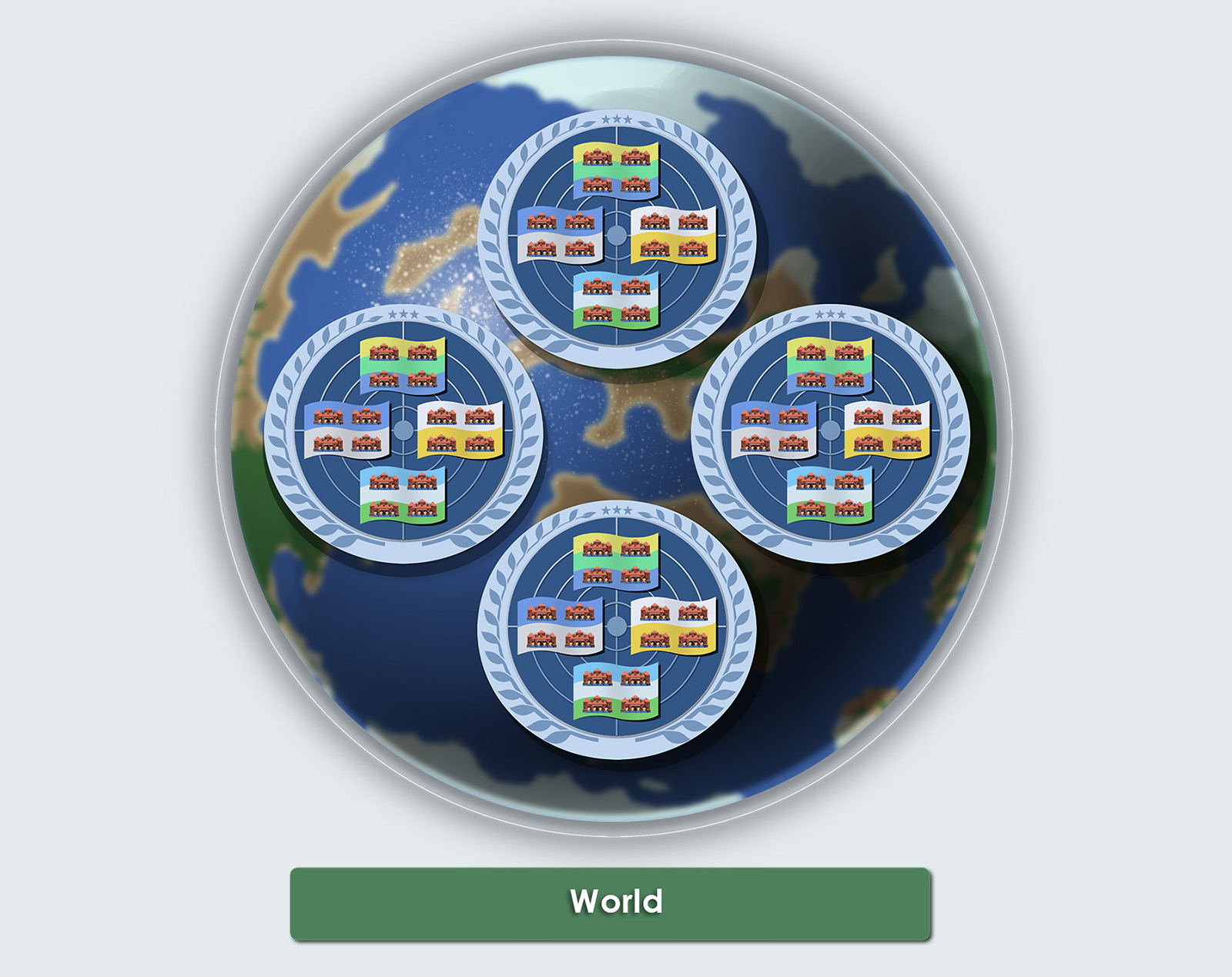
A world consisting of many federations, containing many countries each, containing many towns each, containing many citizens each. Recursive structure allows infinite scalability.
In a large virtual world, their can be many sub-societies and governments within them, and they can push up against each other and interact, in both cooperation and conflict. Whether that result in trade or cultural warfare depends on the temperament of the Citizens and their aligned values, which is a fascinating effect considering they all share the same end goal. Within shared goals, conflict can and should exist, and navigating that conflict is at the heart society’s purpose.
As they butt-up against each other these societies will have to craft their relationship, what the borders look like, both physical and metaphysical. This is equivalent to relationships between civic entities, mirroring the relationships between Citizens that form the core of meaning in the game. Just like the relationships between Citizens, the relationships between towns, countries, and other institutions rely on rich identities: the reputations of the settlements, their histories, their goals and values. The richly defined identities that determine these relationships exist both at the Citizen and Citizen-created institution level.
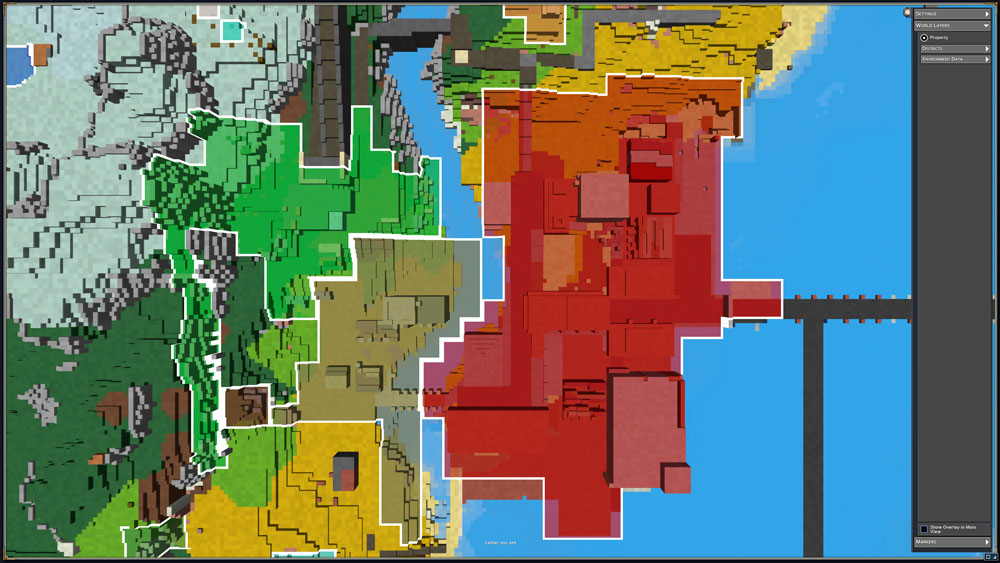
A map overview of bordering settlements in an Eco world.
Being a Citizen of a settlement and working to develop its relationship to neighboring settlements is a grand and rewarding enterprise engaging large groups of people, requiring a set of soft-skills scarcely required in video games; diplomacy, empathy, reasoned debate, and understanding of the science that drives the underlying simulation. The many-intersections of these civic structures creates a beautiful thicket to be managed by many people. It creates complexity that is emergent, based on relationships, grounded in the simulation, and requires the development of skills that games virtually never require of you. Embracing complexity that has emerged naturally is foundational to generating meaningful experiences in a game world, it’s not something pre-canned from a designer, but rather it is earned from the history of the world.
A key factor in allowing scale in the creation of these institutions is making them exist as hierarchical layers, with repeated patterns at each layer. For example, small groups of Citizens can form a town, and then towns can band together to found a country, and countries can band together to found a federation.
Towns, countries, and federations will each have their own government, taxes, courts, property, and laws. That civic structure is repeated at many levels, each vertically integrating the lower entity and forming a new one of increasing total population. Thus, a given Citizen can be a member of several overlapping entities: their town, their country, their federation. Within this vertical structure, relationships crisscross throughout it: you have relationships with your fellow townspeople, your compatriots of your country, and members of other countries within your federation. An understanding of the laws and regulations and borders above, below, and between is required to navigate them well and prosper in their overlapping economies.
Because these entities overlap vertically, conflict will arise in their rules. A country may have a law that contradicts a law at a lower-level town. This is a ‘good problem’: it creates the need for jurisdiction, and decisions made between the town and country Citizens as to how to rectify this conflict, deciding which should take precedence. Issues like this can become incredibly difficult to untangle, in a good way. It is
complexity that has emerged not arbitrarily, but meaningfully from Citizen created systems. Unwinding it requires a great engagement with that world and understanding of human nature, and the diplomatic and civic skills to solve it are applicable outside the game.
As you travel up through this vertical stack of civic entities, each containing the previous, the thicket grows larger. One can imagine the formation of a United Nations within the game, a federation of countries, where each country has thousands of Citizens in its population. Defining the rules that can be agreed upon by all parties is a herculean task requiring a level of talent of a far different caliber than usually called for in games.
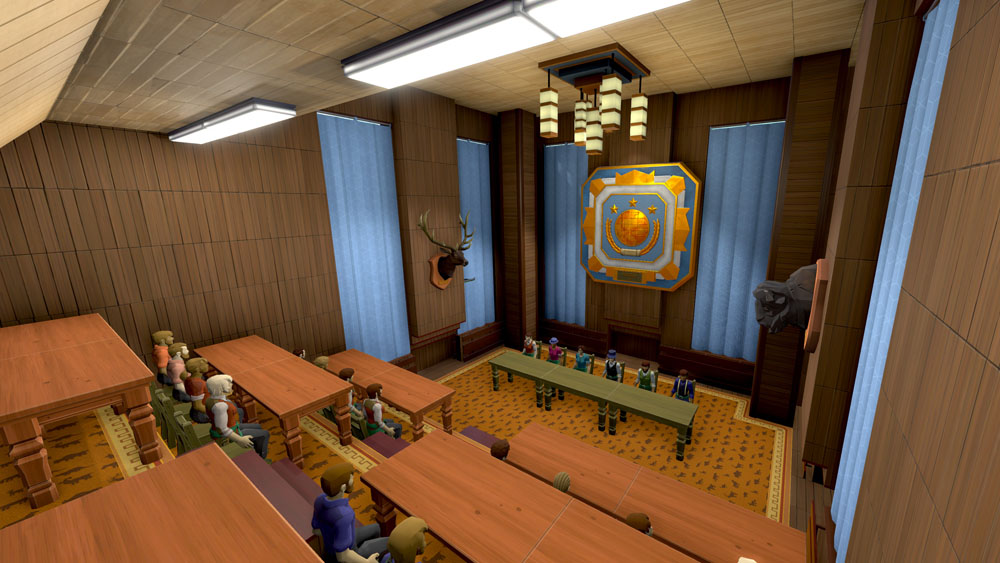
A political meeting organized in an Eco World among representatives of multiple countries
The game can amplify this effect, putting global success behind its conclusion: if the Citizens fail to agree on a path forward, navigating their differences successfully in a functioning society, the world may perish. It creates high-stakes, requiring that require a massive achievement at a societal level to overcome. That is what a virtual world that is the opposite of an escape looks like: an engagement in a richly simulated world with other humans at a deep and meaningful level with real stakes.
This stacking of institutions, each containing the lower level, doesn’t have to stop at the world layer. That same approach can be applied to many worlds.
Unlike a typical MMO, in Eco there can be many thousands of these worlds with Citizens allowed to host them at will, cultivating them into permanent communities, each with its own character represented by the institutions contained. These worlds can then begin to connect to one another, in a system that mirrors the same pattern of civic entities within a world. Similar in the way that multiple countries IE, just as a world can form a federation of nations, a ‘galaxy’ can also form a federation of planets. Travel between them can be established using in-game mechanics: in a reality-based simulated world like Eco, it would be a space program, whereas in another type of word it might be something different like a portal or teleporter. Such a technology can be unlocked over time, perhaps limited to later-game advancements to give the community time to mature, perhaps immediately available to jump start it.
The key technology needed to unlock such a thing is to provide a world-network service, which allows Citizen-hosted worlds to define how they would like to interact with other worlds. A primary trait of this network is that it is opt-in, with the specifics of the border being Citizen defined. Because each world is hosted by Citizens, the very physics of them may be different. One world may be awash in gold as a resource, while another has sparse amounts of it, such that an unfettered connection would negatively impact their economies. It’s necessary for each world to make very distinct choices about which other worlds to connect with in order to preserve the simulation they have chosen to run.

A streamer or player will be able to create their own networks of worlds, allowing Citizens to travel seamlessly between them with their avatar and items.
A world-network, then, would have rules about which worlds are able to join, and each world that is allowed to participate would need to additionally define the individual borders between the worlds and what is allowed to move between them. Perhaps one world allows people to travel between them, but locks currency from transferring, so that other Citizens may visit but not disrupt the economy. Perhaps another allows free-flow of all currencies and becomes a space-port of sorts.
The guiding principle here is that each connection is defined by Citizens. Just as Citizens within a world can meet together to form a township, a country, or federation of countries, so may they meet with another world to define the nature of the connection between them. A ‘galactic council’ can be imagined in which the representatives from dozens of worlds meet together to agree on the terms of their relationships, the rules of interaction, the method of resolving disputes, and the pursuit of grand goals crossing worlds. Rules can be set at the network level as well as to what kind of simulation it represents and the mandates thereof. A system at this level might represent millions of people, each from rich worlds containing stacks of civic entities many layers deep with Citizens living their virtual lives in untold number of ways.
When considering connections between worlds, careful attention must be paid to worlds of other modded physics and styles. One network may wish to limit transit between worlds to only those that exactly match a defined set of physics, no mods allowed. Another may allow a specific set of mods only. Another may allow completely different games.
And here is where we address a core problem of the idea of a ‘metaverse’, how to handle the connection of disparate games. Should a Halo rifle be allowed into a world of medieval sorcery? When you have many networks of worlds, that decision can be made differently for different worlds. The Citizens can convene and make those calls themselves, or enter into worlds contained in networks that have specific defined restrictions already in place.
The beauty of this is it’s a system that only works when both the worlds and world-networks are Citizen run, and each gets to define their own ruleset and work it out among themselves. In a walled-garden approach where you have only two layers (the players and the devs) this is much more difficult; the ‘word from above’ will decree what is allowed to transfer between worlds. Every cross-platform and cross-game connection will be a mammoth ordeal between competing corporate entities that are disincentivized to connect. Putting that in the hands of Citizens is a much better approach, can move much faster, and allow any game that supports it to connect to a network transfer layer that allows connecting between worlds, with the specifics configured per-network.
This idea of open world-networks connecting multiple worlds of different games together creates a unique possibility: the networks can be associated to larger online communities. Now a streamer can have their own network of connected worlds, using the tools of the network system to decide which games are part of it and the rules for transitions between them. Audience-created worlds that comply with the simulation goals can be allowed to join and participate in the larger network. This would be incredibly valuable to the streamer: now they are presenting not only themselves playing in a game as their content, but offering a network of many worlds and games available for all their audience to connect to, to become Citizens within, and participate in a whole gaming universe centered around their brand.
This opens up a new kind of value to streamers, a system that allows them to integrate their audience into interactive play in a much deeper way. One can imagine a streamer allowing audience members to join their world as Citizens and cast votes to the direction they want to develop it, participating in galactic councils and debates. The wall between audience and participant starts to fade away, as no longer is an influencer playing in some inaccessible world where an audience can only watch, but in a network in which they can deeply engage and participate in.
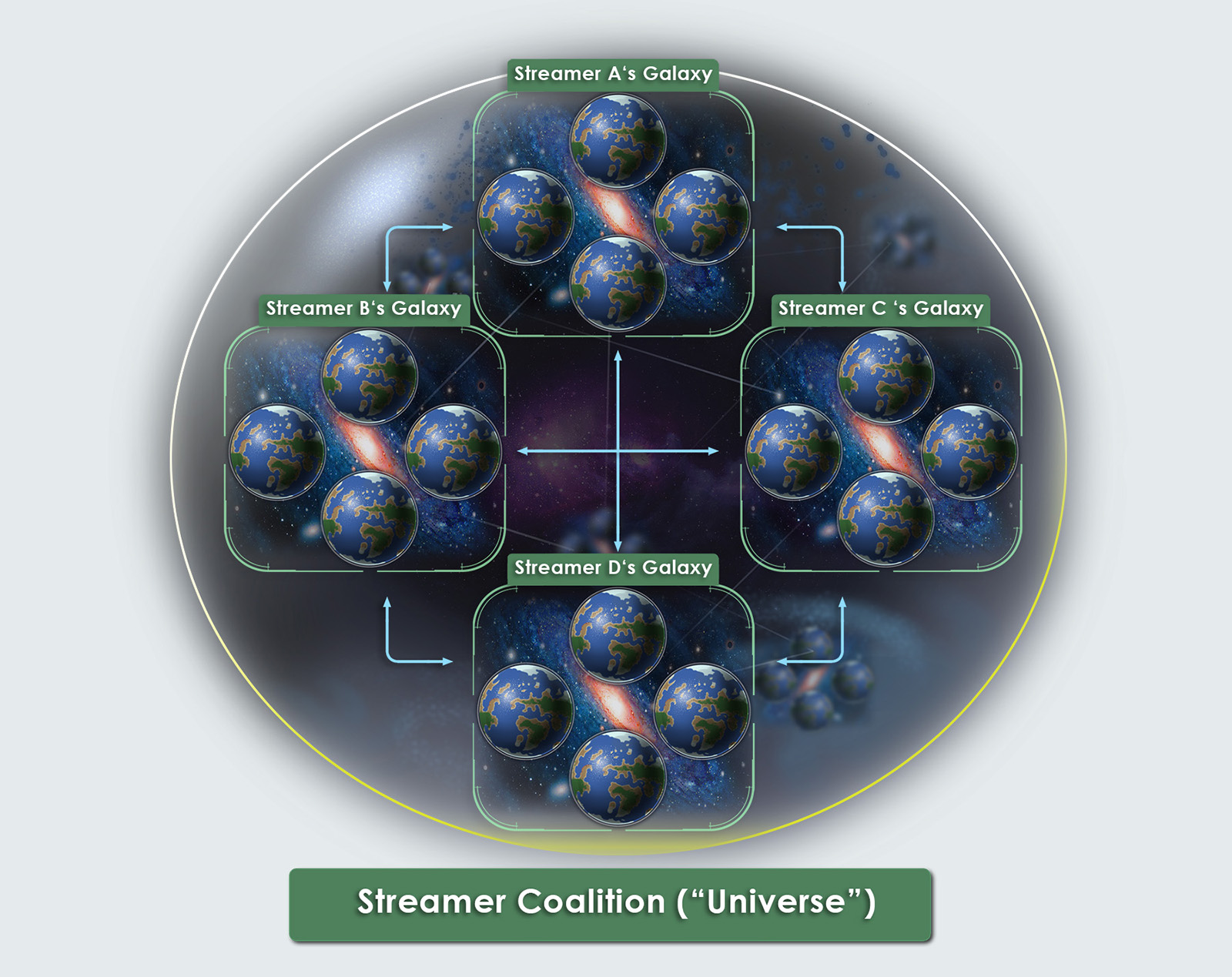
Multiple networks (aka galaxies) can be created in a 'universe', with streamers connecting multiple worlds as a key use case. The transitions between galaxies can be rigorously defined to support the type of gameplay in each gala
The vertical stacking of entities doesn’t have to stop there, these world-networks (galaxies) can be aggregated into networks-of-networks (universe), and beyond to networks-of-networks-of-networks (metaverse). At each layer up, the Citizens create it and manage it and guide it the same way as the lower levels: through civic discussion and debate and action. Each relationship between networks can be intermediated by the Citizens that comprise them. The formation of this metaverse will be a grand project of connection.
This is a metaverse grown organically from the bottom-up¸ starting not from a giant corporation offering a walled-garden where they can own and define every connection, but from individual citizens growing rich communities over time. As individual worlds grow, they connect into networks. As networks grow, they connect into multiple networks, spanning different types of games. These networks-of-networks can continue growing as well, connecting to other such entities to form triple-nested networks, with the ability to connect entirely different genres of games. That societal structure of nested settlements (towns containing Citizens, countries containing towns, federations containing countries) is extended, with as many hierarchical layers as needed, able to support any number of Citizens and worlds and games and genres.
This is a qualitatively different approach to the idea of a gaming metaverse than offered by existing large game companies, because their focus is ownership of the network and maximum exploitation of value. Allowing their users to own the network and define its connections would kill their golden-goose of exclusive control. It is why I believe the metaverse will emerge not from a giant company, but from the organically growing connected worlds of many games from many Citizens, developers, modders, hosts, and streamers participating. For large companies with eyes on the metaverse, It is a classic innovator’s-dilemma situation, one ripe for disruption by games owned by their Citizens.
Eventually, as such a metaverse gains in prominence and population, the giants will have to capitulate and allow connections to the network-of-networks, in order to gain access to millions of players across thousands of gaming universes that would otherwise be excluded from their games due to their walled-garden policy. These networks can reach outside of games, connecting to other kinds of virtual experiences, real-life experiences, and beyond. I believe such a bottom-up metaverse will conquer a walled-garden by these first principles, and provide something of greater meaning and value than the alternative ever could.
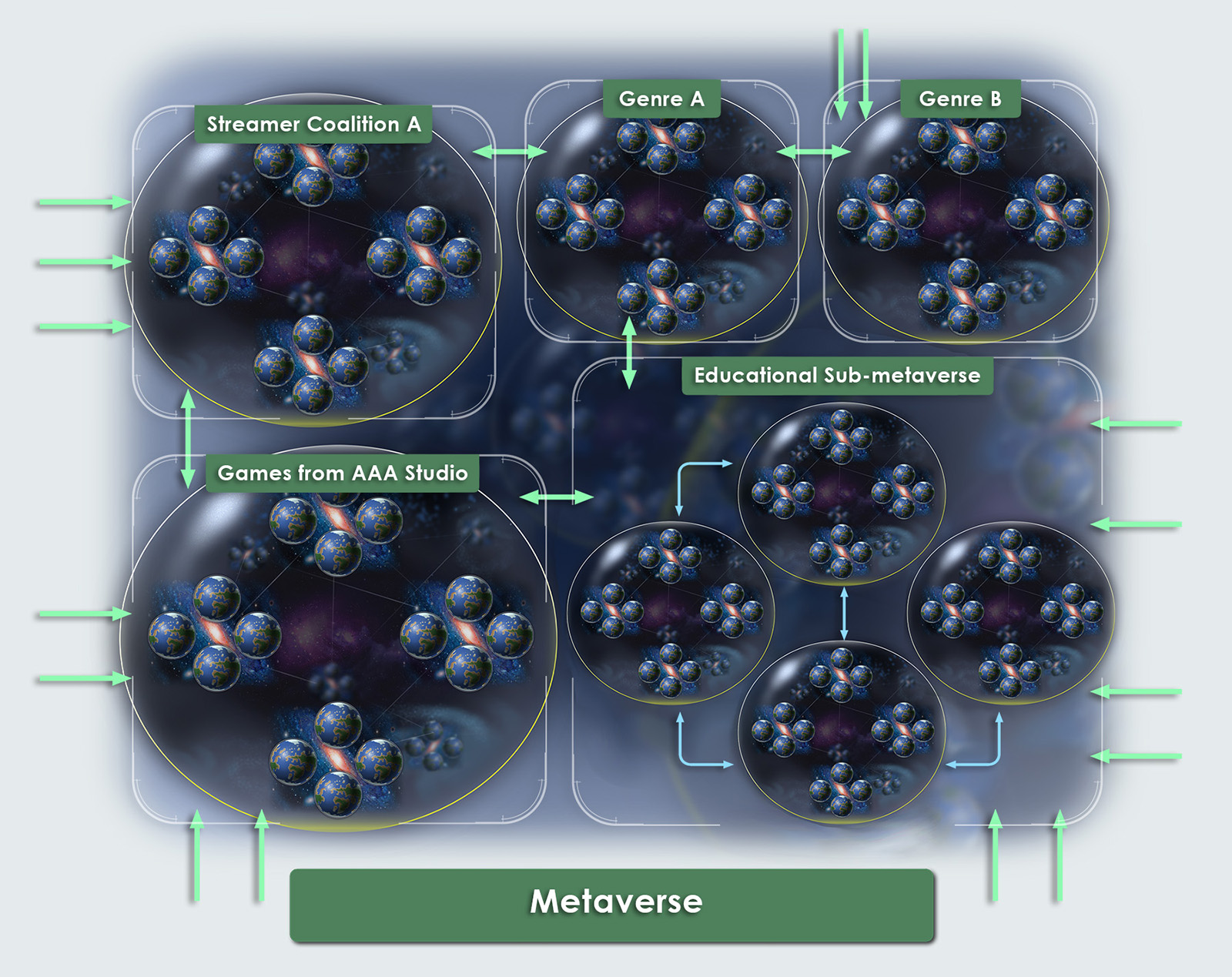
The recursive community structure can continue indefinitely upward, creating networks of universes (metaverses) that have complex travel between them allowed. This structure can encompass both games and other types of experiences.
At each level that these societies are being created, scaled-up, and aggregated into the next higher level entity, value to its is being created.
That value resides spread out through the society they have created. It’s in the relationship of the Citizens, their dedication to the community, the solutions to societal problems, the structures they have created (including incorporeal ones like governments), the history they have built, the economies that underpin it, and the understanding and inspiration the populace has gained from it. Each of these towns, countries, federations, worlds, networks of worlds, and nested-network of worlds is its own economic engine, humming along generating value out of thin air.
That ‘value’ can be exchanged in monetary forms as well. It can take the form of a delivery service a Citizen runs in game to help other users transport goods. It can take the form of a campaigning service a Citizen runs to help spread a political platform in game. It can be ‘wages’ for top level positions in the government, paid from in-game taxes. It needn’t be crypto (at least until crypto is something safer, and wanted/trusted by Citizens), and can simply be digital currency issued by the companies that create it (in the style of VBucks, Robux, Minecoins, etc).
That value can be generated at the meta-world level as well: A Citizen can develop a mod and sell it to worlds. It can be a network that a streamer runs to engage their audience, with a fee to join the servers. It can be a network fee to connect to a thriving network of worlds. It can be any of an infinite number of ideas that Citizens will come up with, which they will do when given the tools to do so and the economies of value to make it feasible.
And all this value, in all its forms, must be shared throughout, allowing exchange into real-world currency. The Citizens are the ones that earn it, and transactions can flow upwards through the various layers that contain it. A purchase inside a town might elicit a tax from the town containing it, the country containing that town, the federation containing that country, the host of the world containing that federation, the network containing that hosted world, and the network-of-networks containing it, and so on. It could go to the creator of the mod that developed the item that was sold in the transaction. It could go to the streamer who earns an affiliate fee for the audience they bring to the network. And a cut can go to the developers of the gaming worlds in which the transaction takes place, as well as the developers of the networking connection layer that makes it all possible.
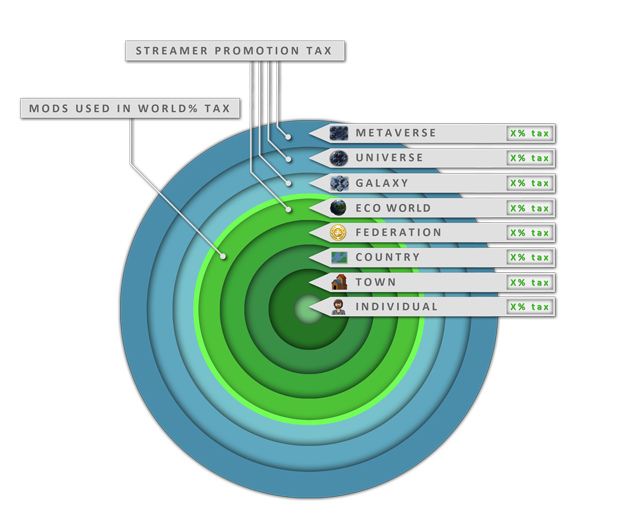
At each level up the social stack, new taxes can be introduced to fund grand enterprises, including the game and network itself.
That’s a potentially large stack of taxes, but each can be microscopic and opt-in; if a Citizen doesn’t think a world’s tax relative to its value it fair, they can simply go to another world. With full transparency of pricing and percentage of tax at each level, Citizens can make informed decisions, and create competing services if they think they can create similar value themselves at a lower cost.
And so a unique business model for games is introduced, where the companies creating these games and the services to connect them don’t need to sell a single product. They instead are providing engines of value, with the framework for Citizens to explore every possible nook and cranny of what can be valuable in a game, and taking a cut on that. No loot boxes needed, no in-app purchases of consumable digital goods. Instead, it’s the business model of nations: a tax on the economic value that they make possible, which is a fitting model for a universe of owning Citizens. It is a more fair and authentic system of monetization for developers and creators at all levels.
Taken in sum, we have the following blueprint for what a beneficial, bottom-up metaverse would look like.
There is a step-by-step evolutionary path to bring this to fruition: at each step the project is viable and increasingly valuable. That is, a virtual world with a single Citizen is valuable. As more Citizens join, its value increases. As they form hierarchical societies with that world, the value increases. As they connect to other similar worlds and allow transit between them, the value increases. As they connect to other dissimilar worlds from totally different games, the value increases. As modders begin creating unique types of worlds and connecting them to these networks, the value increases. As streamers promote those worlds and allow their audience to engage, their value increases. As mammoth networks of worlds begin to connect to one another, the value increases.
Each next-step in the process yields a viable product, and each step builds oh the previous step, adding and aggregating value, with each new party welcomed to participate. It is an evolutionary model that doesn’t require a tech leviathan to accomplish.
Contrast this with the walled-garden approach, where the theme-park is pre-built at great expense, and the doors opened to the willing customer to pay the fee and soak up the experience. It is light years apart. And not just that, but a Citizen-owned metaverse would be ethically superior, because the
resulting worlds would have their population as owners, contributors to which real value will be earned, generated by the contributions they make.
If the metaverse is to be the second-home of humanity, if that begins with virtual worlds built for gaming, it is imperative that we build this in a way that scales up real value to its Citizens from the start.
This is the final article in a three-part series describing the vision of what we're building at Strange Loop Games.
Click here for Part I: Players as Citizens.
Click here for Part II: Worlds of Consequence.
Email: [email protected], Twitter @jkrajewski